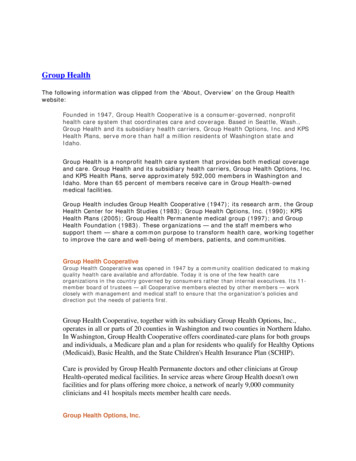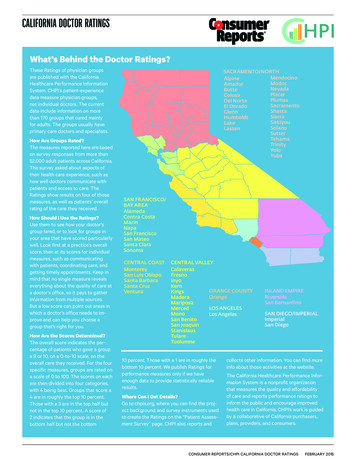
Transcription
Group HealthThe following information was clipped from the ‘About, Overview’ on the Group Healthwebsite:Founded in 1947, Group Health Cooperative is a consumer-governed, nonprofithealth care system that coordinates care and coverage. Based in Seattle, Wash.,Group Health and its subsidiary health carriers, Group Health Options, Inc. and KPSHealth Plans, serve more than half a million residents of Washington state andIdaho.Group Health is a nonprofit health care system that provides both medical coverageand care. Group Health and its subsidiary health carriers, Group Health Options, Inc.and KPS Health Plans, serve approximately 592,000 members in Washington andIdaho. More than 65 percent of members receive care in Group Health-ownedmedical facilities.Group Health includes Group Health Cooperative (1947); its research arm, the GroupHealth Center for Health Studies (1983); Group Health Options, Inc. (1990); KPSHealth Plans (2005); Group Health Permanente medical group (1997); and GroupHealth Foundation (1983). These organizations — and the staff members whosupport them — share a common purpose to transform health care, working togetherto improve the care and well-being of members, patients, and communities.Group Health CooperativeGroup Health Cooperative was opened in 1947 by a community coalition dedicated to makingquality health care available and affordable. Today it is one of the few health careorganizations in the country governed by consumers rather than internal executives. Its 11member board of trustees — all Cooperative members elected by other members — workclosely with management and medical staff to ensure that the organization's policies anddirection put the needs of patients first.Group Health Cooperative, together with its subsidiary Group Health Options, Inc.,operates in all or parts of 20 counties in Washington and two counties in Northern Idaho.In Washington, Group Health Cooperative offers coordinated-care plans for both groupsand individuals, a Medicare plan and a plan for residents who qualify for Healthy Options(Medicaid), Basic Health, and the State Children's Health Insurance Plan (SCHIP).Care is provided by Group Health Permanente doctors and other clinicians at GroupHealth-operated medical facilities. In service areas where Group Health doesn't ownfacilities and for plans offering more choice, a network of nearly 9,000 communityclinicians and 41 hospitals meets member health care needs.Group Health Options, Inc.
Group Health Options was incorporated in 1990 as a wholly owned subsidiary of Group HealthCooperative. It offers a variety of health plans in Washington and Northern Idaho that providechoice and flexibility to meet the needs of large and small employers. These range from adefined physician-network plan to point-of-service (POS) plans in which members can get carefrom outside the network for higher out-of-pocket costs.Group Health PermanentePhysicians have played a key role in Group Health Cooperative's history and continue tooversee every aspect of clinical care and quality. Their commitment to family medicine andprevention has shaped a broad approach to care at Group Health, one that focuses on thewhole patient, not just an illness or condition.After more than 50 years as Group Health staff, our doctors formed Group Health Permanente(GHP), an independent professional corporation, in 1997. This multispecialty medical group isunder exclusive contract to provide care in Group Health-owned or -operated facilities andworks in partnership with Group Health Cooperative management.Group Health Center for Health StudiesThe Group Health Center for Health Studies (CHS) conducts epidemiologic, health-services,and clinical research related to prevention, diagnosis and treatment of major health problems.Funded primarily through government and private research grants, the center is located inSeattle. It has 250 full- and part-time staff, including university faculty members.Since the CHS's founding, researchers have published scientific journal articles — many ofthese collaborations with researchers from the University of Washington, Fred HutchisonCancer Research Center, and other institutions. CHS research has helped Group Healthbecome a national leader in areas such as breast cancer screening, immunization, and chronicdisease management.Group Health FoundationThe Group Health Foundation uses philanthropy, health care innovation, research, andcommunity partnerships to improve the health of children and adolescents and promotediversity within health care. Since its founding in 1983, the Foundation has awarded milliionsof dollars in grants to community groups and Group Health programs.AffiliatesKaiser Permanente and Group Health affiliated in 1997. Each remains independent andseparate, but work together in areas such as marketing to regional and national customers,sharing best clinical practices, and full-service member reciprocity.From the History of the Cooperative section,Groundbreaking AffiliationsMore expansion and refinement of Group Health's operations continued in the 1970s. Medicalcenters opened in Lynnwood, Federal Way, Olympia and Redmond. In 1977, Eastside Hospitalopened in Redmond. A central distribution and support facility was built in Renton. Growthcontinued by absorbing Tacoma's Sound Health Association and its 11,000 members. By theend of 1979, enrollment stood at 277,920.Continued expansion was coupled with diversity and community-building in the 1980s. Medicalcenter councils were established in 1981 to augment consumer participation. Also that year,Group Health and the University of Washington signed the first affiliation agreement betweena health maintenance organization and a university. In 1982, the first agreement was signedto provide care by non-Group Health physicians on Vashon and Maury islands.
Early in 1983, the Board approved creation of a research arm, the Group Health Center forHealth Studies; a patient information service, the Center for Health Promotion; and acharitable foundation, now called the Group Health Foundation. Group Health bought anexisting health plan in Spokane, which served other parts of Eastern Washington and was laterexpanded. Enrollment topped 300,000.Group Health FoundationDrilling down, the next step was to look at the Group Health Foundation. This Foundation isvery disturbing to me.Donors Help Members Struggling to Cover Their Medical BillsBrandy Cruz-Pedro and her family learned this frightening truth when her husband,Nemorio, had to undergo two surgeries following a traumatic brain injury."Suddenly my husband couldn't work, so we lost our principal source of income," Brandysays. "After he left the hospital, I had to stay home from my own job to care for him. Withthree children to feed, medical bills, and the other expenses all families must deal with, wedidn't know how we were going to make it."Nemorio's second brain surgery was scheduled for Dec. 27 of last year. Fortunately, thefamily are Group Health members, so the delicate procedure would be performed by anexpert neurosurgical team. But the holiday season was looking bleak. There wouldn't beenough money for presents for the kids let alone the mortgage payment.Then an unexpected phone call changed everything."A Group Health social worker contacted me and said that we were eligible for theSponsored Care Program," Brandy explains. "Group Health would help us with our copays,deductibles, and other out-of-pocket medical costs for the next six months as well as sixmonths back. It was such a relief."Many of those who receive this special help are struggling in the aftermath of acatastrophic accident, the diagnosis of a life-threatening illness such as cancer, or majorsurgery. Some are coping with serious chronic diseases such as Parkinson's or diabetes.Group Health members can be referred by Group Health staff to receive Sponsored Care orapply on their own. To be eligible for health care assistance, members must be at a certainincome level and meet other requirements. Donations to the Sponsored Care Fund of theGroup Health Foundation help cover medical expenses in our effort to bridge the gap forthose most in need.Cheryl Scott Receives Innovators AwardCheryl Scott, senior advisor to the Bill & Melinda Gates Foundation and former GroupHealth CEO, presented her acceptance remarks upon receiving the 2008 Innovators inHealth Care award at the Gift of Health Gala. The award recognizes individuals who havemade exceptional contributions in health care.(Acceptance Remarks)Thank you. Tonight and every night (and day), the Group Health Foundation is having alasting, positive impact on the problems that kids face. Tonight is another reminder of itsimportance throughout the region. That this award comes from the Foundation makes iteven more special.
I believe the ability to be thoughtful of what "is" takes us to our full potential. To say "Idon't know" is an extraordinary practice of great leadership. I think that is as importanttoday as it has ever been.However, seeing what is and saying what you don't know — that is absolutely notsomething for sissies. Saying "It beats the heck out of me" does not necessarily creategreat confidence in the board room or job security with your boss.Which comes to my third and final musing, and that is on the gift of courage.I think it obviously takes a ton of courage to lead, to make decisions, to get the critiquesand the constant comments from the ever present Greek Chorus. (You know, those guyswearing togas who sit on the sidelines, never entering the stage of play). But I also think ittakes a lot of courage to act knowing that you don't have any guarantee whatsoever thatyou will be successful. Chances are quite good that, in fact, you may well end up beingsecond-guessed and looking like the fool.But you do it anyway. You act with clarity and humility; you act with gratitude. And Ibelieve you do it all because of those people — you do it for the ones who saw the sparkand who kindled the flame. And you know something? They should expect nothing less.In the world of courage, bravery, clarity, to which I would also add exhaustion and joy, Iwant to end my remarks by expressing my profound gratitude to my family. They are myteachers in all things and have shown me that the human spirit truly soars with everygiggle and every hug. I have learned that all that one may have ever done is nothing nextto your child's love and their belief in you.Again, thank you ever so much for this incredible honor. Good night and be safe out there.Gala Donors Raise 675,000 forYouth Health Programs"Good Fortune and Good Health" was the theme of the 2008 Gift of Health Gala thatcelebrated Chinese culture and raised 675,000 for Group Health Foundation programs.See the list of sponsors for the 2008 Gift of Health Gala.A highlight of the evening was the presentation of the Innovators in Health Care award toCheryl Scott, former Group Health CEO and currently a senior advisor to the Bill & MelindaGates Foundation. Scott Armstrong presented the award to Cheryl with a retrospective onher career at Group Health that captured her passion, accomplishments, and humor.Six-hundred guests were in the packed room at the Westin Hotel to invest in the missionand values of Group Health. Donors contributed more than 140,000 to the evening'sspecial appeal to benefit Group Health’s Family Beginnings program. In the special appeal,a young family shared their story of the challenges of teen pregnancy and how the staff atFamily Beginnings supported them throughout the pregnancy and as new parents."The generosity of our donors is so inspiring," said Laura Rehrmann, president of theFoundation. "Their gifts will support critical health programs for the most vulnerablemembers of our community."Special thanks to event co-chairs Jim and Jan Dwyer (Jim is CEO of Washington DentalService), and Mike Wanderer, MD, and Jan Suyehira, MD, of Group Health Permanente.Their leadership made this year's Gala the most successful ever."
Gala SponsorsCheryl Scott: 2008 Innovators in Health Care Award RecipientThe Group Health Foundation presented Cheryl Scott, former Group Health chief executiveofficer (CEO) and current senior advisor for the Bill & Melinda Gates Foundation GlobalHealth Program, with the 2008 Innovators in Health Care award.We honor Cheryl for her inspiring leadership and her dedication to improving public healthin our own community and worldwide. The award was presented at the Gift of Health Galaon Oct. 11.This Year's RecipientBefore joining the Bill & Melinda Gates Foundation, Cheryl served Group Health Cooperativefor 25 years, including seven years as Group Health's president and CEO (1997 to 2004).She lead the Cooperative during a time of transformation that resulted in a demonstrableimprovement in quality of care and a more accessible and efficient health care system.A Seattle native, Cheryl received both a bachelor's degree in communication and amaster's degree in health administration from the University of Washington. Cheryl joinedthe Foundation in 2006 as Chief Operating Officer. She oversaw all major operationalfunctions and, following Warren Buffett’s historic gift, led Foundation-wide changeinitiatives to achieve large and rapid increases in organizational and grantmaking capacityand to impact some of the world’s biggest health challenges.In her current position as senior advisor, Cheryl helps build capacity and expertise acrossthe Foundation's Global Health Program to ensure that vaccines and other health solutionsreach the people who need them most.Cheryl is also a clinical professor in the Department of Health Services at the University ofWashington, where she teaches a graduate seminar on leading complex adaptive systems.About the AwardThe Innovators in Health Care award honors visionary leaders who exhibit courage,perseverance, and a pioneering spirit to improve health care for the community or for largepopulations.Award recipients are chosen after seeking recommendations from leaders within GroupHealth and from the community at large. Previous award recipients include Aubrey Davis,Don Brennan, Leo Greenawalt, Treuman Katz, Donald Berwick, MD, and William (Bill)Foege, MD, MPH.A Focus on Childhood ImmunizationImmunizations are one of the most effective ways we protect the health of our children.Did you know that Washington state ranks 46th out of 50 states in immunization rates forchildren aged 19 to 35 months? In 2007, 69 percent of these children had a completevaccination series. These low immunization rates could have serious consequences for thehealth of our children and our communities.The Group Health Foundation, with the support of donors, is committed to increasingimmunization rates for our children. Over the next three years the Foundation plans toraise 1 million for childhood immunization access and education initiatives.
Increasing AccessToo many children have fallen through the cracks when it comes to immunization.Language, cultural, and socio-economic barriers are just a few of the reasons why a childmay not have received all the recommended immunizations. Group Health will bepartnering with schools and local health departments to identify creative ways to increaseaccess through a school-based approach. This means bringing immunizations to where thechildren are: in schools.Education for Parents and ProvidersA growing number of parents in our state are worried about the safety of immunizations.Some of this concern stems from conflicting and often confusing information in the mediaand on the Internet. Parents need the right information so they can work with theirproviders to make informed decisions about immunizing their children.The Foundation will be working with its community partners to develop new educationaltools and resources for both parents and providers. These tools will help them worktogether to make sure that children are protected against infectious diseases like measlesand whooping cough.Group Health's Crisis Outreach and Relief for Employees (CORE) FundAdministered by the Group Health Community Foundation, the CORE Fund offersemergency financial support to Group Health employees facing difficult situations.The generosity of Group Health employees made a difference in their co-workers'lives in 2006:Hospice ProgramPeople are becoming more aware of their end-of-life choices, and enrollment inhospice continues to grow. Group Health staff cared for 1,004 hospice patientsin 2005. Your support of these programs makes such a difference to so many.Last year, 694 donors contributed 86,818 to Group Health CommunityFoundation funds that support hospice programs, and 355,123 to endowedfunds that create lasting, permanentincome for hospice careWhere Hospice is goingOur hospice specialists are held to very high standards of medical certificationand ongoing education. But did you know that hospice issues have only recentlybecome part of routine training in medical schools?Nurses work to control pain and ease symptoms while home health aides help withpersonalcare and bathing. Medical social workers and counselors give emotional support andassistwith the complex planning and decision-making required at this time. Volunteersoffer theirtime to serve in both caring and practical ways. And the patient’s own doctorcontinues to supervise care in concert with the Hospice Program’s medical directorand board-certified hospice specialists.Most hospice care is done in homes, taking advantage of technology to meetpatients’ changing needs. With electronic medical records, laptops, and mobile
phones, nurses can quickly relay information from the field to pharmacists anddoctors. Even with this kind of advanced medical care, hospice is fundamentally aspiritual model: one where a counselor helps with a eulogy, or where a volunteerbrings companionship to a patient facing thetransition of death alone.Hospice Donations pay for:Pay salaries of bereavementcounselorsn Send nurses to leadership conferencesto learn new ways tosupport care deliveryn Host the annual Dave FoxSymposium which features speakers,training, and a recognitiondinner for oncology staff, hospiceand home health providers, andvolunteers.Board of DirectorsWe are led by a caring group of community leaders, Group Health members, and healthcare professionals.Peter Davis, chairPresident and CEO, GACO WesternSandeep Sinha, vice chairDirector of technology partnerships, Motorola Inc.Scott Armstrong, secretaryPresident and CEO, Group Health CooperativePegge Till, MHA, treasurerEducation and health care consultant, WordssailRuth BallwegDirector, MEDEX Northwest Division, University of WashingtonWilliam (Bill) Bradford, PhDEndowed professor of business and economic development, University of WashingtonSchool of BusinessPhilip K. BusseySenior vice president of corporate affairs, Puget Sound EnergySue ByingtonVice president, Providence Health and Services (retired)Nancy B. CannonVice president, Human Resources Shared Services Group, The Boeing CompanyAnn DaleyTrustee, Group Health CooperativeExecutive director, WA State Higher Education Coordinating BoardStuart Grover, PhDChairman, The Collins Group, Inc.Jane Lee Quehrn, MPHPublic health advisor, Washington State Department of Health
Jeff Lindenbaum, MDDirector of adolescent services, Group Health CooperativeChristopher Marr, senatorSixth legislative districtJill OstremVice president, Consultative Specialty and Acute Care Services, Group Health CooperativeJill A. RyanCommunity volunteerJeff SakumaDirector of Medicaid and subsidized programs, Group Health CooperativePaul Sherman, MD, MHAMedical director, Consultative Specialty Services, Group Health PermanenteHugh Straley, MDPast president, Group Health Permanente, and Medical Director, Group Health Cooperative(retired)Norm SwickSenior vice president and chief risk officer, Washington Mutual (retired)Janet WainwrightPresident, Jane Wainwright Public RelationsJennifer L. West, APRSenior vice president and chief operating officer, Rockey Hill & Knowlton SpokaneGeorge H. WilliamsSenior marketing director and executive account leader, CB Richard Ellis GroupJames WongPresident and CEO, Avidian Technologies CRMGroup Health Center for Health StudiesFrom the About sectionGroup Health Center for Health Studies (CHS) is a non-proprietary, public-domain research institution withinGroup Health, a health care system based in Seattle, Washington.To serve its mission, Group Health Center for Health Studies (CHS) conducts and disseminates researchand evaluation on: The organization, delivery, quality, and cost of health care.Prevention, treatment, and management of illness.Strategies at the individual, provider, system, community, and policy levels thatresult in better health org/aboutus/history.html
Research has been a part of Group Health Cooperative's vision since it was founded in 1946. In fact, GroupHealth's first mission statement said that the organization would "contribute to medical research."The Cooperative began its first research project in 1956 with K. Warner Schaie, PhD. Called "The SeattleLongitudinal Study," this investigation of age-related cognitive changes among Group Health memberscontinues today under the direction of the University of Washington's Sherry L. Willis, PhD.Other early research consisted of a handful of externally initiated projects, including a study of Pap tests atGroup Health showing that fewer new cases of cervical cancer when individual women had repeated Paptests—a finding that contributed to the development of cervical cancer screening guidelines.First research department establishedRequests for access to Group Health enrollees and data increased through the 1960s, prompting theorganization to establish the Group Health Research Department in 1969. Led by Richard Handschin, MD,the Department coordinated external research and conducted studies in quality assurance, operationsanalysis, facilities planning, and marketing.Under Handschin's leadership in the early 1970s, Group Health contributed to projects with majorimplications for national health policy. Among these were the RAND Health Insurance Experiment and twodemonstration projects—the Model Cities Project and Plan 9 Rural Health Project—both designed toimprove health care for low-income people.In 1975, the Group Health Medical Staff founded the Department of Preventive Care Research, led byRobert S. "Tom" Thompson, MD. This department's early work led to Group Health's Lifetime HealthMonitoring Program, Well-Child Visit schedule, and Breast Cancer Screening Program. In 1978, Thompsonestablished the Group Health Committee on Prevention, which developed Group Health's first evidencebased clinical guidelines.In 1978, the Group Health Board of Trustees adopted the organization's first formal research policy andguidelines, resulting in the current Research Committee and Human Subjects Review Committee. Withrepresentation from Group Health members, management, and medical staff, the Research Committeeevaluates research proposals for problem significance, research design, and adequacy of researchpersonnel and facilities. It also assesses each proposal's likely impact on Group Heath resources. TheHuman Subjects Review Committee serves as Group Health's federally mandated Institutional ReviewBoard (IRB). This committee ensures that the rights and welfare of study participants are adequatelysafeguarded.Center for Health Studies foundedWith this solid foundation for research in place, the 1981 arrival of Group Health Chief Executive Officer GailWarden marked a new era of commitment to scientific inquiry. In his administration's first strategic plan,
Warden called for a more comprehensive, integrated system of monitoring and evaluating the care-deliverysystem and its relationship to the health status of its enrollees. The Group Health Board of Trusteesestablished the Center for Health Studies (CHS) on January 26, 1983, and CHS opened its doors just ninemonths later.In its first noteworthy success, CHS recruited Ed Wagner, MD, MPH, as director from the University of NorthCarolina at Chapel Hill. With Wagner at the helm, the Center's research soon helped Group Health becomea national leader in such areas as breast cancer screening, immunization, smoking cessation, healthpromotion in seniors, and epidemiology and management of common chronic diseases. Focusing onevidence-based medicine and improved clinical outcomes, Group Health and the Center emerged as keyplayers in transforming the U.S. health care system and helping shape global research priorities, clinicalguidelines, and coverage standards.Leading with a spirit of collaborationBy 1993, CHS was expanding, with grant revenue topping more than 5 million. As staff and funding grew,so did opportunities for cutting-edge collaboration. By teaming up with researchers locally, nationally, andinternationally, CHS added breadth and depth to its findings, using multi-disciplinary approaches to studylarger populations. Among our key partners—then and now—are the Fred Hutchinson Cancer ResearchCenter, Veterans Affairs Puget Sound Health Care System, and several major universities, including theUniversity of Washington (UW), Harvard University, and the University of Michigan.This collaborative spirit reached new heights in 1996, when CHS leaders catalyzed the formation of theHMO Research Network (HMORN), a 15-member consortium of U.S. health plans with sophisticatedresearch capabilities. Through the HMORN, CHS works with researchers nationwide to combine and studydata from a diverse population more than 10 million strong. The HMORN's hallmark project is the NationalCancer Institute-funded Cancer Research Network (CRN), led by Wagner and focused on gaining newinsight into cancer prevention, early detection, treatment, long-term care, and surveillance. The CRN is nowin its third funding cycle and is widely hailed as a model of multi-site collaboration at its best.CHS also provided collaborative leadership through the MacColl Institute for Healthcare Innovation, foundedin 1992. The Institute worked with Group Health to create and pioneer the Chronic Care Model, fuelinganother massive Wagner-led project called Improving Chronic Illness Care. Funded by the Robert WoodJohnson Foundation, this project has enhanced health care for chronically ill people by supporting systemschange, promoting research in chronic illness management, and providing technical assistance toorganizations nationwide.By the decade's end, Wagner had stepped down from leading CHS to focus on directing the MacCollInstitute. Sue Curry, PhD, became the Center's next director as grant revenue exceeded 10 million, with 19
investigators leading more than 150 active grants. Thanks in part to CHS leadership in several collaborativeprojects, grant revenue soon doubled.CHS also welcomed a new director in 2002: Eric Larson, MD, MPH, previously the medical director of theUW Medical Center. What drew him to Group Health and CHS? Research at Group Health provides theunique opportunity to look for meaningful answers in the "real world" and to help patients benefit fromadvances in understanding and technology—all to boost public health. In Larson's own words, "ThroughCHS, Group Health has a history of translating innovative discoveries into practice. CHS keeps finding waysto help real people everywhere benefit from the best innovations in medical science."Much of the Center's recent work focuses on putting tools for better health at Group Health members'fingertips and empowering them to participate actively in their care. The last several years have broughtexciting findings in health informatics, mental health treatment, alternative healing, healthy aging,immunization, and quality of care. Many of these findings illustrate how the ongoing synergy between GroupHealth research and clinical care leads to groundbreaking innovations. CHS researchers continue toleverage advances in information technology and patient-centered care, leading to positive outcomes thatare changing how health care is delivered—at Group Health and beyond.MacColl Institute for Health Care InnovationMacColl Institute for Healthcare InnovationNamed for a Group Health founder and pioneering physician, W.A. MacColl, MD, the MacColl Institute forHealthcare Innovation at Group Health Center for Health Studies (CHS) was created in 1992. Ed Wagner,MD, MPH, a senior investigator and founding director of CHS, is the Institute's founder and director."We develop tools and expertise to advance Group Health's commitment to 'population-based' or 'planned'care," said Wagner. "This helps the system deliver services that can meet predictable health care needsamong groups of patients with common chronic illnesses, using interventions strongly grounded in clinicalevidence."In the mid-1990s the Institute developed the Chronic Care Model, a widely endorsed and adopted approachto improving ambulatory care that has guided clinical quality initiatives in the United States andinternationally.The Institute is the home of The Robert Wood Johnson Foundation's Improving Chronic Illness Care (ICIC).Since 1998, ICIC has been involved in further developing, testing, and disseminating Chronic Care Modelbased clinical improvement efforts.From the About PageOur Vision: To be the research partner of choice for those seeking to shape health and healthcare delivery.
Our Aims: Be recognized as the Nation’s premier resource for population-based healthand health care research by leveraging the Network’s unparalleled member andgeographic diversity, research and research translation strengths, andorganizational, human capital, and data resources. Contribute to national and global dialogues on health research and policy byserving as a credible source of evidence-based information a
Group Health is a nonprofit health care system that provides both medical coverage and care. Group Health and its subsidiary health carriers, Group Health Options, Inc. and KPS Health Plans, serve approximately 592,000 members in Washington and Idaho. More than 65 percent of members receive care in Group Health-owned medical facilities.










